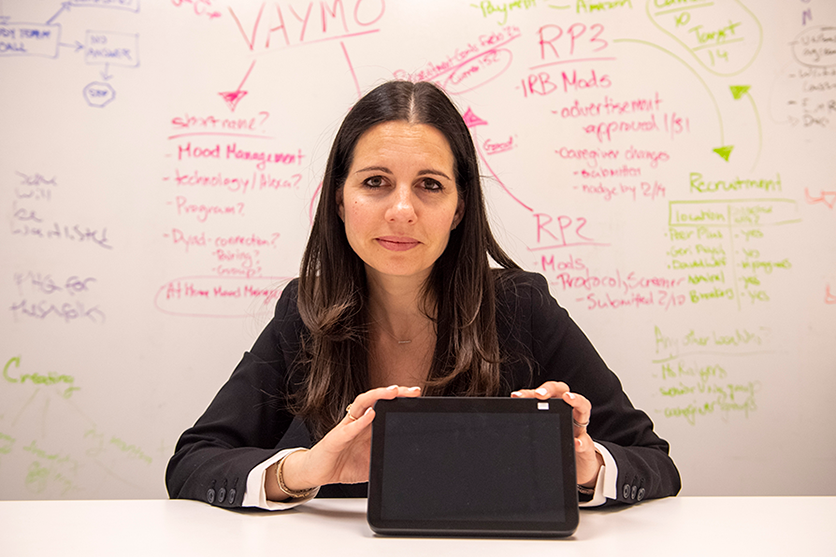Is the solution to the mental health crisis already in your pocket?

From automated text messages to bespoke apps, Northwestern Unive’s Center for Behavioral Intervention Technologies, co-led by Andrea Graham, PhD, (above) brings its transformative research to the Institute for Public Health and Medicine. (Photo by Randy Belice)
March 12, 2024
Andrew Nellis
Evidence continues to mount, showing that the United States is in the midst of a historic mental health crisis. But with 25.6 million people lacking health insurance and a persistent drought of practicing mental health professionals, many are seeking treatment options that can bypass the insurance and bureaucratic logjam.
Digital mental health interventions (DMHIs) use everyday technologies like phones and computers to teach users evidence-based self-management strategies. Research has shown that such tools can provide effective treatment for conditions such as anxiety and depression, particularly when paired with low-intensity support from a coach (1, 2, 3, 4).
If made widely available, DMHIs may offer a much-needed option for people struggling with untreated mental health conditions.
Northwestern’s Center for Behavioral Intervention Technologies (CBITs) is a long-established leader in the field of digital mental health interventions, and it is the newest center to join the Institute for Public Health and Medicine. Now entering its thirteenth year, CBITs is leveraging cutting-edge technology, including artificial intelligence, to better meet the nation’s mental healthcare needs.
“Treating mental health is a challenge that most people, including healthcare system leaders, payers, and legislators from across the political spectrum, recognize as a top priority,” said David C Mohr, PhD, director of CBITs and chief of Behavioral Medicine in the Department of Preventive Medicine. “Research has repeatedly shown that digital mental health services can be as effective and less expensive than standard treatments like psychotherapy and pharmacotherapy when used properly. Bringing our work to the Institute for Public Health and Medicine presents an invaluable opportunity to broaden our network of expertise and expand our mission to support other areas of population health.”

Research has repeatedly shown that digital mental health services can be as effective and less expensive than standard treatments.”
Evidence-backed interventions
The idea of using someone’s phone to deliver mental health treatment has been around for some time. However, despite their proven effectiveness, DMHIs have not been broadly adopted, and attempts to integrate them into healthcare systems have been modestly successful at best.
One element that’s critical to achieving widespread adoption, says CBITs researchers, is ensuring that the interventions themselves are soundly designed and backed up by scientific research. That’s especially true in an era when for-profit “wellness” apps have become ubiquitous, according to CBITs Co-Director Andrea Graham, PhD, assistant professor of medical social sciences and preventive medicine.
“Our interventions are rigorously researched and equitably designed, built by practicing psychologists with the goal of producing clinically-meaningful engagement,” said Graham. “Our approach leverages human-centered design and implementation science to ensure that users are actually receiving proper care that’s backed by science.”
CBITs has a long history of research on DMHIs for depression and anxiety. Their studies have consistently shown that 8-12 week DMHIs, supported by a lay coach, are very effective in reducing symptoms of depression and anxiety (1, 2, 3, 4, 5). CBITs has also worked in low and middle-income countries, demonstrating that DMHIs can be deployed in low-resourced environments to provide effective care for depression.
Our interventions are rigorously researched and equitably designed, built by practicing psychologists with the goal of producing clinically-meaningful engagement.”

CBITs has also been expanding its research to other mental health conditions such as eating disorders. FoodSteps, a mobile intervention, is a key project in that effort. The intervention guides participants through a 16-week program designed to empower healthier behaviors and reduce binge eating.
As a testament to CBITs’ user-centric philosophy, FoodSteps was planned in close collaboration with people who have sought treatment for binge eating and weight management. Their input directly influenced the intervention’s design, informing everything from the language used in prompts to the website’s layout. In addition, the project team is working with healthcare clinics and food pantries to understand how to best implement the intervention in real-world scenarios, which may include purpose-specific handout materials and consultation prompts.
Other examples of CBITs’ design and approach include projects such as:
- Technology-Enabled Service for Caregivers of Older Adults with Depression, led by Allison Carroll, PhD, investigating a technology-enabled service that provides homebound older adults with specially programmed voice assistants (Amazon Alexa devices) to support them in managing depression and stress, and a web-based tool that allows the care manager to assist the older adult.
- Personalized Text Messaging for Depression, led by Rachel Kornfield, PhD, leverages SMS text messaging to provide people with depression and anxiety strategies for managing depression, and is exploring the integration of large language models.
- Text Messaging for Suicide Prevention, led by Jonah Meyerhoff, PhD, aims to develop an automated and self-directed suicide prevention program for teens that can be delivered over text messages.
- Nonsuicidal Self-Injury in Young Adults, led by Kaylee Kruzan, PhD and David Mohr, PhD, seeks to develop an intervention for treating the behavior in teens, which is associated with increased risk of developing a mental health disorder, hospitalization, and permanent scarring.
- Single Session Interventions, led by Jessica Schleider, PhD, has conducted multiple trials demonstrating the effectiveness of brief web-based interventions in improving symptoms of depression and psychological wellbeing.
- Adolescent Digital Mental Health, led by Ashley A Knapp, PhD, aims to co-design a prevention service for anxiety for adolescents that can be implemented in public libraries.
Methodological Innovation
Over the years, CBITs has made substantial contributions to research methodology in digital health. One such contribution was aimed at improving low engagement rates often seen in early DMHIs. CBITs researchers recognized that low engagement was largely due to poor design that failed to consider user’s needs and preferences. In response, CBITs began applying human-centered design to its interventions, giving voice to end-users from the earliest design phases, which has since become an essential element of effective intervention development.
Another of the center’s contribution addressed the fluid nature of developing clinical interventions that relied on ever-changing technology. CBITs recognized that typical randomized control trial methods were not well suited to digital technologies, which by their very nature are in a state of constant change. The methodological innovations that CBITs developed have been summarized in their Accelerated Creation-to-Sustainment (ACTS) model—a three-phase process that draws from human-computer interaction research, trial methodology, implementation science.
Calling all innovators
Keeping up with the times is essential when your research relies on the very latest technology. Since its founding in 2011, CBITs has grown from using landline phones to integrating large language models, but that need to constantly evolve can present challenges for researchers. Addressing them requires CBITs to constantly seek out and include new perspectives and partners.
“Creating effective and engaging digital tools requires a great deal of cross-disciplinary expertise,” said Mohr. “We have brought on faculty who are experts in human-computer interaction and human-centered design. We regularly collaborate with implementation scientists and others. That broad spectrum of perspectives is critical, and we are always seeking out experts who are eager and interested to lending their knowledge to our mission.”
That need for deep collaboration is one of the motivations that led CBITs to join the Institute for Public Health and Medicine, which will allow the center to tap into a broader network of institutional and community organizations.
“Joining IPHAM is really about super-charging our group-level capacity,” said Graham. “Being part of the institute allows us to join forces with all of these incredible centers and brain power and the rich creative thought that we will leverage into more enthusiastic science, and that, in turn, benefit people everywhere struggling with their mental health.”
With CBITs, the Institute for Public Health and Medicine now hosts eighteen centers in all, each pursuing different aspects of public health ranging from food allergy and asthma to bioethics.
“From the perspective of population health, it’s incredibly important to leverage technologies that most people already use daily as a means for delivering interventions that improve mental health,” said Ronald Ackermann, MD, MPH, director of IPHAM, senior associate dean for Public Health, and professor of medicine. “We welcome CBITs as a member of the institute and are excited by the incredible potential for new forms of partnership and collaboration to emerge from becoming part of the IPHAM family.”
Learn more about CBITs research, including its postdoctoral program and ongoing projects here.
